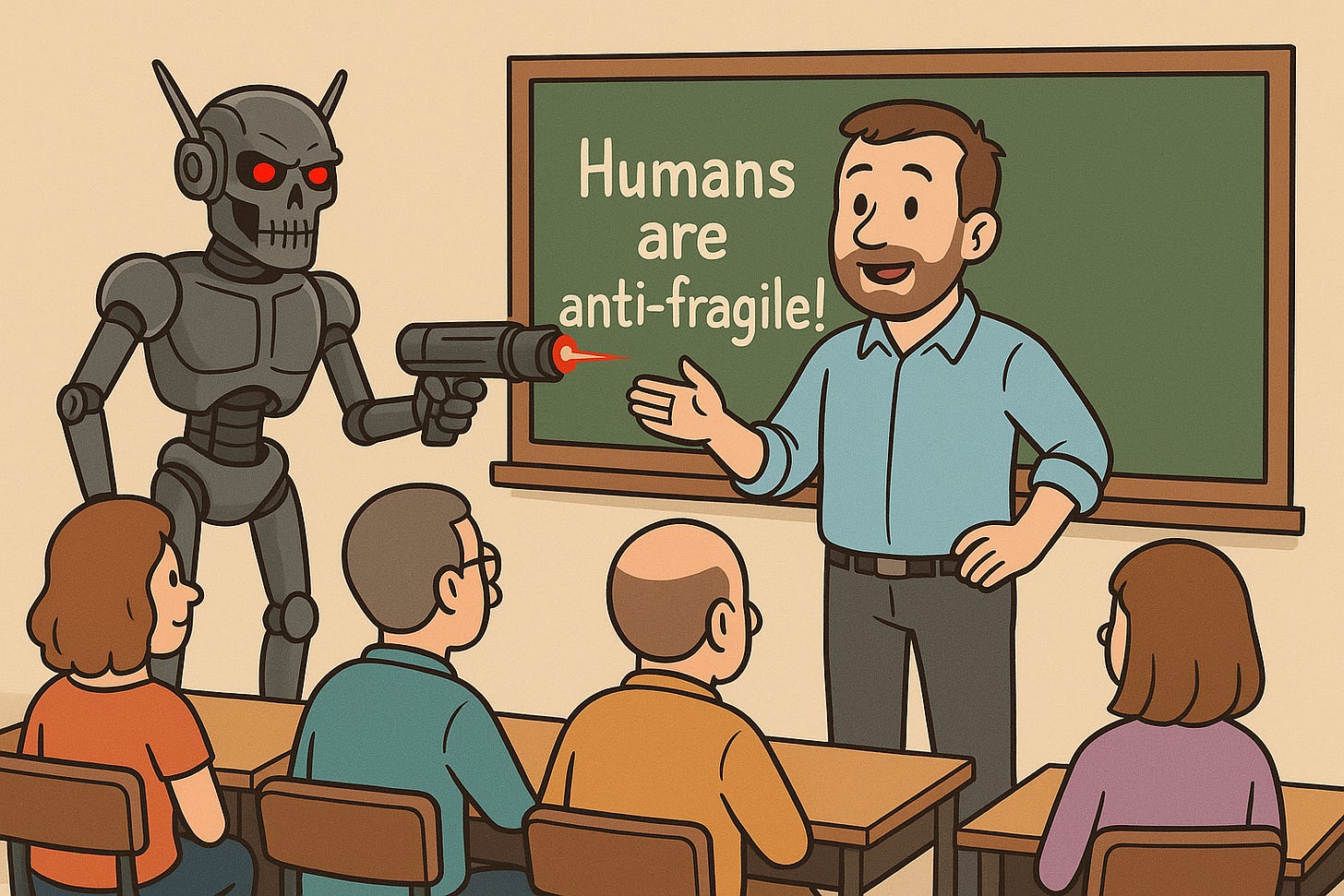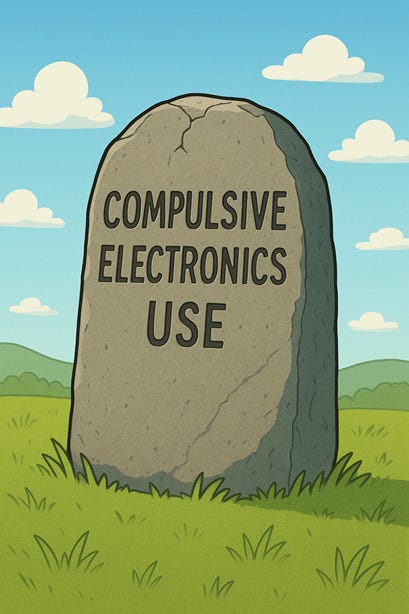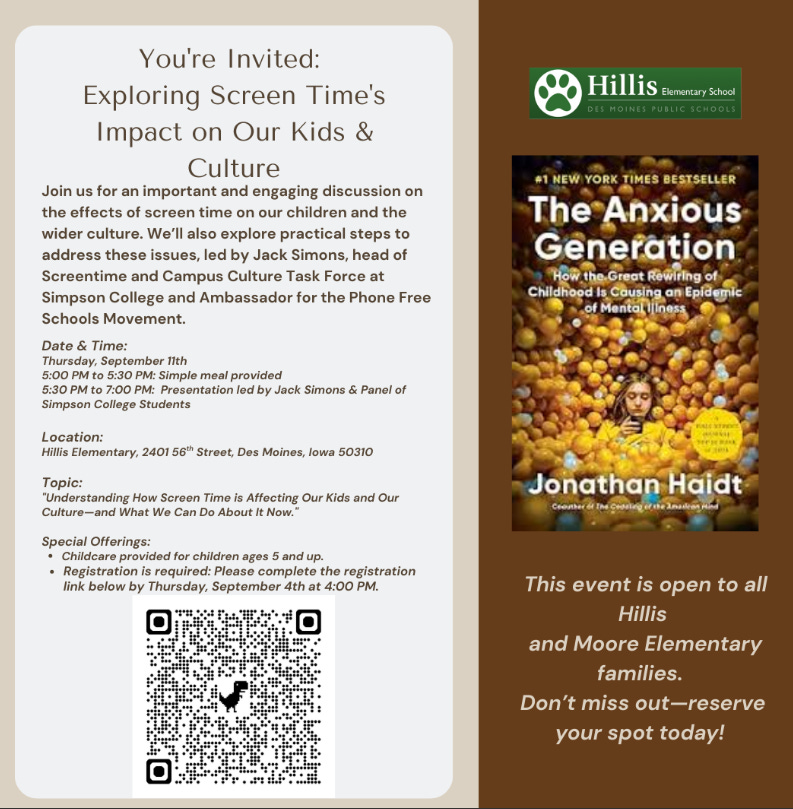Hi everyone. Last week I emailed all the members of the Screentime and Campus Culture Task Force here at Simpson to update them on my activities and our group initiatives as we enter the fall semester. In this post I will discuss the items in that email with some added discussion. The goals of sharing this information are growing the movement and inspiring other campuses to try similar things so we can more quickly figure out what works.
Here we go:
The Task Force is officially and finally called the Screentime and Campus Culture Task Force. For a few months last year we were the Screentime and Mental Health Task Force and then this summer I floated the idea of calling ourselves the Simpson Reconnect Task Force, the idea being that this is actually a lot bigger than just mental health. It’s a cultural issue. Sean Killingsworth, the founder of the Reconnect Movement, saw this from day one and chose the perfect word for his organization. I’ve definitely always been inspired by that and after talking to Sean this summer I saw it would be wise to keep our two organizations separate in name. So Screentime and Campus Culture Task Force it is and shall be and I like that. For me involving the word culture gets at the idea that phones are intertwined with every aspect of our lives and it will take all of us if we want to even try to untangle ourselves.
Speaking of Sean Killingsworth, he gave our group a tremendous boost this summer when the Des Moines Register did an article on the Reconnect Movement in general and on Reconnect Simpson in particular. Here’s the article. This generated so much positive publicity for us before the students had even returned. We got a new president this summer and it was very cool to know that the first thing she’d heard about our work came through a big time media body. Major thanks to Sean for setting this up and a huge shout out, too, to the Gen Z reporter for the story, Chris Meglio.
The Screentime and Campus Culture Task Force now includes 18 members. The group is made up of six full-time faculty, two administrators, four students (including the student body president and vice president), and six staff members. I’m really proud to lead this group. It’s crazy. I’m especially proud of the number of experts in medicine and/or psychology that are part of the task force. This legitimizes the cause, it just does. I told all the members in my email how seriously I take the fact they’re willing to put their name on this project which is clearly my life’s passion. I take that very seriously and it motivates me and I hope it helps keep me sharp and focused.
Our chapter of The Reconnect Movement has its first official event on September 15. I know we’re all excited to see how the students and overall campus respond to something so simple and positive. I have vowed to stay out of their affairs but I will gladly share their stories with you here as I can.
The head of counseling and I addressed all the athletics coaches for the second time in early August. I haven’t yet felt great energy from our group of coaches so I deliberately tried to not do or say too much. I focused on sharing the results of the Screentime and Mental Health survey we offered student athletes last spring. I will share some summaries of this data later in this post. I don’t mind the coaches being low energy. That is coach life. I’m stoked that a couple of programs will be working with us this year. I hope to help athletes see that digital habits should be treated as competitive variables just like nutrition, weight lifting, etc. I think a dedicated team could help us demonstrate this fairly easily and then that information could be shared in order to help anyone who is working on something meaningful see that their digital habits necessarily affect the quality of their work, just like any other obvious variable.
A couple weeks ago I led a faculty development built around this question: “Would campus culture benefit from the development of a campus-wide classroom electronics philosophy?” During this presentation I compared myself to John Connor (from The Terminator, duh), the man charged with saving mankind from machines and the digital apocalypse. I thought this talk went extremely well. Whether it did or not I had a great time. I loved connecting with faculty I’d never met and I love running a room. I miss it.
I should say more about the topic of the talk. I know I’ve thrown the word philosophy around in this space before, plenty. Actually when I proposed this topic a faculty member warned me against using the word philosophy because he thought there could be pushback from other faculty members. I knew what he meant but I stuck to my guns and I’m glad I did.
I still may not know how to fully articulate this but I do believe this issue has to be taken apart philosophically - not just practically - if we are actually going to change and improve. Maybe the simplest way of putting this is: I want both our faculty and students to come to the realization that, except when they are immediately necessary for a specific task, they don’t actually want to have unnecessary electronics in class. I’m convinced that through honest conversation and the constant application of actual reasoning, we could arrive somewhere close to this. In any case, this is a college full of legal adults who are instructed by adult academics with the freedom to run their classes as they see fit. I believe the majority of stakeholders will need to choose what I consider a better path (a path to better mental health, academic, and overall life outcomes) in order for anything like a policy to even be proposed let alone implemented.
The best and only real way I know to present an electronics-free or electronics-reduced approach to education or life in general is to share data and testimonials. I’ve tried to do that from the start, so for the last four years.
I think you know I tend to agree with our ally Gabriela Nguyen, founder of Appstinence, whose organizational tagline is “Gen Z - Social media is optional. Why isn’t anyone telling us this?”
When I share data and testimonials I’m seeing more clearly that what I’m trying to do is to present that alternative point of view, one where compulsive electronics use is a choice and not something we’re all just born into now. (Nguyen has referred to this as “reframing” the issue, which I really like.) So when I talk about adopting a philosophy towards electronics use in the classroom or on campus or anywhere, for me the creation of that philosophy has to come from an honest accounting of the potential benefits of electronics use vs. potential harms. For me we are still very much in the stage where we are becoming comfortable discussing the harms for what they actually are. It’s understandable we’re still in this place because actually wrapping your mind around the harms and potential harms is staggering. We do not need to rush this process especially if we want it to work. This is why I’m most interested in working with those who feel ready to try some things - like the Reconnect kids - because I have a sense that much of this can be accomplished organically.
Some marvelous, organic connections came out of that faculty development. I connected with professors I’d been wanting to get to know for years and I hope I proved I’m not crazy and I might be worth listening to. The coolest result of the faculty talk though was it seems to have inspired a couple of professors to “work with me.”
As a result of my talk, one professor has created an awesome extra credit project for her students. The project is designed to help students develop new hobbies in the real world. During the faculty development we talked about how Gen Z kids in general struggle to try new things and socialize organically. One of the best ways to socialize organically is through engagement in hobbies in the real world. I was lit up by this idea and we will be checking in on progress over the course of the semester. Results can then be shared at future faculty development and maybe we inspire others to take similar chances.
Another professor invited me to come share our data with his class of first year students this week. That went very well also, I think. Those kids were very sweet. I was honored to be able to take over their space for a day and the plan in that class is to weave concepts discussed at the PD into classroom practices throughout the semester. Again, results can be documented and shared for the good of all. I love this. This faculty member enthusiastically asked to be added to the task force after I’d spent that hour with his class. That was a great email to receive. I love Simpson.
We’ll keep coming back to this idea of philosophy vs. policy. Another way I try to think of all of this is . . . as a culture we have become behaviorally monolithic. The behavior we all engage in is compulsive electronics use. My position is that this behavior has to be taken apart philosophically before or at least while it is being taken apart practically. For example take the case of school phone bans. By banning phones from schools we have taken a massive practical step towards healthier societal outcomes. But I’ve always felt that, unless we provide the full explanation for why phones are being banned - to counteract a horrible, horribly embarrassing mental health crisis, not just to improve student focus - we will be leaving a ton of potential gains on the table.
I’ve used Chatgpt to create the monolith I’m describing. It’s starting to crack, you can see. Phone bans may have created the initial fissure. Now philosophy, real reasoning, can creep in. Colleges and universities can handle this kind of thinking. So can some corporations. We will come back to this.
The data we gathered during spring surveys would technically be considered informal. The process certainly was. As a result I don’t have full permission to share the exact data we gathered and I especially can’t and won’t share student testimonials here. What I can quickly do though is give you a broad sense of what the data shows. This is the broad picture conveyed by the data I shared at my faculty talk and with a class of first year students this week:
More than half of students surveyed said they spend too much time on screens and too little unstructured time outdoors.
Nearly half of students surveyed said they spend too much time on screens and too little time socializing in person.
More than three-quarters of students surveyed said their average daily screentime is at least four hours.
More than one third of students surveyed said their screentime interferes with their academic success.
More than half of students surveyed said their screentime interferes with their sleep.
About a third of students surveyed said their screentime negatively affects their mental health.
About three-quarters of students surveyed said they’re interested in reducing their screentime and increasing the unstructured time they spend outdoors.
About two-thirds of students surveyed said they’re interested in reducing their screentime and increasing the time they spend socializing in person.
More than half of students surveyed agreed or strongly agreed with this statement: “It would be easier for me to reduce my screentime and improve my habits if other students, faculty, and staff worked to do the same, simultaneously.”
More than two-thirds of students surveyed agreed or strongly agreed with the statement: “I am concerned about kids’ dependence on screens and if I could do something to help, I would.”
I will be discussing this data in this way at an upcoming event at my daughter Opal’s elementary school. Here is the flyer:
If you’re in the area you should think about coming to Hillis Elementary on 9/11. The first 2/3 of my presentation will be utilizing data from The Anxious Generation almost exclusively, in order to discuss the data itself but also the impact the book has had on the world. From there we will shift to the question DO THE KIDS EVEN WANT THIS SCREEN-BASED LIFESTYLE? At that point I will share our data and a group of Simpson students will serve on a panel where they can discuss these matters with parents of elementary aged children in real time. Finally the conversation will turn to the topic of recess. I have come to see increased recess as the elementary version of school phone bans. It is an absolute necessity and it aligns perfectly with the movement and there are no downsides. We will talk way more about this.
If you’ve followed my journey at all you know that my being invited to host and run such an event within DMPS is . . . something you would not have predicted. I hope the fact that this is happening shows how ready we all are for these conversations and that I’m capable of engaging parents on such a sensitive topic. I think this night could lead to some awesome outcomes I can’t predict at all. I’m very lucky to have a team of students coming with me. One of them “graduated” from Hillis about ten years ago :)
Final Thoughts:
I hope you feel like all this is pretty cool, pretty damned optimistic. I’m inspired on a daily basis right now which I’m really glad for because I’m still panicked every day as well. Now the panic is simply over whether I’ll be able to remain at Simpson beyond this year.
I made quite a bit more money as a veteran teacher than I make here and I have two kids. I may have to go back to teaching or figure something else out after this year. We will see. I’ve told this to the leadership here and they get it and they’re supportive. I know all I can do is keep pushing and see where that leaves me. I’m putting this here so you know how important this year is to me. We are in a moment right now and I hope to make the most of it. In particular if you’re at a college or university and anything I’ve talked about here or elsewhere is lighting you up at all, I’d love to hear from you and our entire task force would love it too. We definitely can’t bust up that monolith on our own and the busting is so liberating.
Email me at Jack.Simons@simpson.edu or go ahead and survey your students like we surveyed ours. This is your ammo and I’ve been blessed to have almost too much ammo from the start. But no pressure, of course.
FYI - I still can’t do the Comments thing. Maybe I could handle it if I were famous. For now it’s a philosophical decision. Comments sections feel wrong to me, on a philosophical level.
Thanks for your time today, everyone. Stay tuned.
Jack




